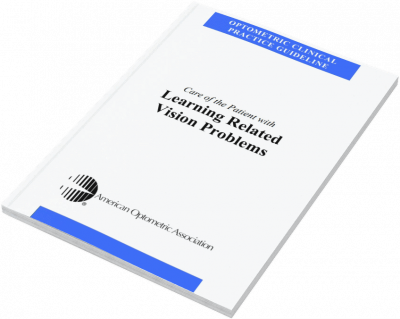Learning and Behavioral Related Problems
Learning and Behavioral Related Problems
It is estimated that 80 percent of what a child learns comes through the visual system, and that behavior is strongly influenced by vision. Dr. Press co-authored the Clinical Practice Guideline of the American Optometric Association on Care of the Patient with Learning Related Vision Problems. Download the Clinical Practice Guideline in its entirety.
A condensed version of this is available as a Quick Reference Guide.
Checklists of signs and symptoms involving visually based learning problems typically address performance problems.
These include a variety of difficulties in reading, writing, spelling, and math that may appear to be seemingly careless errors. The struggles that a child goes through include homework taking hours longer to complete than what the teacher expects when the work is assigned. It is understandable that this results in frustration and behavioral issues.
Behavioral problems can show up as avoidance
Sometimes a child simply gives up trying. That is why we keep the environment in our Vision & Learning Center is much like Liberty Science Center. Because our therapy is individualized and customized, we set conditions to help your child explore how he is interpreting what he sees. Unlike most educational settings, we focus on trusting what you see rather than worrying about right versus wrong answers.
As a child learns to modify what he sees through a variety of probes including lenses, prisms, filters, and computerized activities, he gains or re-gains confidence in his visual intellect. As an example, recognizing visual patterns and integrating them with corresponding sounds is crucial to word recognition and usage. This enables your child to develop the visual readiness skills necessary to be more fully responsive to educational interventions through school.
Vision and ADHD/ADD
Helping Children Develop Vision Tools
Our goal in The Vision & Learning Center is to help a child develop the visual tools necessary to respond more fully to her or his educational setting. What is true for school applies to the home setting as well in getting homework done. Regarding ADHD, we adhere to the guidelines of the College of Optometrists in Vision Development which state:
“Any assessment of a child who is experiencing reading or learning problems should also include a comprehensive vision evaluation by a developmental optometrist. The role of the developmental optometrist in this multi-disciplinary approach is to assess the child’s visual abilities. Attempting to function in school with poor visual abilities may result in fatigue, short attention span, avoidance of near work, and slower performance.”
College of Optometrists in
Vision Development
Vision Development
We work with parents and other professionals in a collaborative environment. There is no one answer in helping all children with specific diagnoses, only pieces of puzzles to solve together.
More information about Vision and ADD/ADHD is available in a journal article on Visual Factors in Childhood Behavioral Disorders co-authored by Dr. Press
Autism Spectrum Disorder (ASD) and Vision Therapy
To learn how vision therapy can help with asd – please see our autism vision therapy page.













